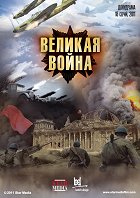Regie:
Anna GrazhdanKamera:
Dmitriy KiptilyyBesetzung:
Adolf Hitler (Arch.), Joseph Vissarionovich Stalin (Arch.), Mikhail Konovalov, Evgeniy SinchukovFolgen(8)
-
Barbarossa (E01)
-
Bitva za Moskvu (E02)
-
Blokada Leningrada (E03)
-
Stalingrad (E04)
-
Kurskaja duga (E05)
-
Operacija "Bagration" (E06)
-
Ot Dněpra do Oděra (E07)
-
Bitva za Berlin (E08)
Inhalte(1)
Soviet Storm is a new and epic television history of the Second World War’s Eastern Front. Giving an unprecedented Russian perspective on the war’s most decisive and bloody theater. This was a conflict of staggering scale and savagery. Four out of five German soldiers killed in World War Two died on the Eastern Front. The Red Army suffered ten times as many dead as the Western Allies combined. The total dead on all sides was more than 30 million, most of them civilians. The war was seen by both sides as a struggle for existence. In that light, Hitler and Stalin were prepared to accept losses on any scale to achieve final victory. Soviet Storm tells the story of this titanic clash of arms blow by blow. Using archive film and photography, computer generated imagery and innovative reconstructions, From the German invasion of 22 June 1941 Operation Barbarossa (the largest military operation in history), through to the brutal fighting outside the gates of Moscow, the savage street-fighting of Stalingrad, and the long, bloody road to Berlin, this is an epic retelling of the world’s most devastating conflict. (Verleiher-Text)
(mehr)Kritiken (1)
I gave the extensive Soviet documentary series of the same name 4/5 stars for the complexity of its processing and the enormous amount of documentary material that appeared in it - although, of course, it did not avoid and could not avoid schematism and ideological distortion resulting from the time and place of its origin. However, the modern Russian series should avoid simplification and filtration of information. It's not that it's overtly propagandistic, but rather that it reduces the documentary perspective to purely technical aspects, meaning that against General X, who had 250 tanks of a certain type and so many soldiers, there was General Y, who had this and that. The domestic and international political dimensions of the war are practically not addressed, which, of course, had significant importance for the actual course of the battles. Stalin was not only the commander-in-chief of the army in his country, but also the high priest, ruler of industry, and all decision-making institutions, and his attitudes were crucial for understanding the events on the Eastern Front, especially in the first year of the war when he led the defensive fights. At the time of the invasion, the Soviet army had 5 million soldiers and often significantly outnumbered its opponent in almost all categories. In the first 7 months, the Soviet forces lost 3.9 million soldiers, thousands of tanks, and airplanes, and these losses were inflicted on them by the enemy who was supposed to be intimately known to the Soviet soldiers and was not supposed to have the element of surprise on his side since the precise date of the invasion was known to the Soviet leadership from at least 70 sources, including such absurd ones as the German ambassador in Moscow. In the first two episodes of the series, Stalin's name is mentioned only twice, and the viewer does not learn that Soviet commanders were strictly forbidden to retreat regardless of the situation, that the Soviet officer corps had been decimated by extensive purges, and that any activity in terms of independent decision-making was undesirable. Eight episodes in a series are, of course, a short amount of time for any detailed exploration of the topic, but such significant information should naturally have a place in the documentary. Overall impression: 70%.
()

